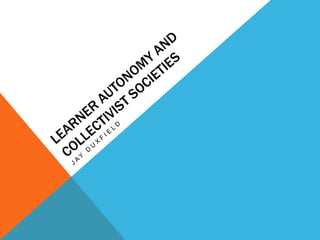
272701 assignment 6 presentation jay duxfield
- 1. Learner Autonomy and Collectivist Societies Jay Duxfield
- 2. Introduction The concept of learner autonomy has revolutionized language teaching over the last few decades by placing the learner at the centre of the learning process and transferring much of the power into the hands of the student. In this presentation I will look at the question of whether the promotion of learner autonomy is appropriate in all contexts. It has been argued that some of the principles of learner autonomy such as independence and freedom from the constraints of an authoritarian teaching system are in fact imposing individualistic western values on collectivist cultures. This raises the question of whether or not learner autonomy is an ethnocentric concept. I will examine these claims and argue that while it is true that some aspects of learner autonomy may be difficult to promote in the same form as they are in the West., others are well suited to the collectivist classroom culture. Therefore teachers should not simply accept or reject arguments about learner autonomy but rather consider how to adapt and apply aspects of learner autonomy that are appropriate to their own particular teaching context.
- 5. Teaching language learning strategies
- 8. Arguments Against promotion of learner autonomy in Collectivist cultures Individualization: Learner autonomy is closely tied to the idea that learners have their own learning styles, capacities and needs (Kojima, 2006, p.68) . It gives students a great deal more independence. This may conflict with the traditions of a collectivist society where group consensus is valued. Learner Centeredness: This approach is not characterized by the transmission of knowledge from the teacher to the student, but rather by the student being involved in the active production of knowledge. This represents power being taken away from the teacher and being redistributed in a more egalitarian manner. This may be viewed as a reduction in the traditional status held by a teacher in collectivist societies.
- 9. Arguments Against promotion of learner autonomy in Collectivist cultures Jones (1995, p.228) describes the promotion of learner autonomy as being “laden with cultural values, especially those of the west” And therefore unsuited to the Cambodian tradition of learning and teaching. Ho and Crookall (1995) also claimed that autonomous learning was in opposition to the teacher-centered, authority oriented traditions of Chinese education. Therefore not appropriate for students in Hong Kong.
- 10. Arguments Against promotion of learner autonomy in Collectivist cultures It has also been argued that assuming that a method that is appropriate in the west is therefore necessarily appropriate in other cultures is a form of cultural imperialism. “yet another version of the free, enlightened, liberal West bringing one more form of supposed emancipation to the unenlightened , traditional, backward and authoritarian classrooms of the world” (Pennycook cited in Palfyman 2003 p.7)
- 11. However There are also arguments which suggest that the collectivist culture actually facilitates the promotion of learner autonomy Group work has been associated with the promotion of autonomy because it allows students to make decisions independently of the teacher (Harmer, 2007, p.166). Despite his criticisms of the promotion of learner autonomy, Jones (1995) describes how his students reacted positively to working in groups, independently of the teacher.
- 12. Autonomy and relatedness Relatedness is described by Littlewood(1999, p.74) as contact, support and community with others. If this contact is felt to be controlling it can cause us to lose our sense of autonomy. But If this contact is supportive (such as the strong bonds between members of in group in collective cultures combined with the desire maintain harmonious relations within the group ) it can facilitate autonomy. Autonomy may be accomplished through interdependence rather than independence.
- 13. Conclusion Learning a second language is a massive task which cannot be completed in the classroom. For a student to be successful, learning must continue beyond the classroom and the teacher will not always be there to assist . In this sense the goal of language teaching is that the student become an autonomous user of the language who continues to learn outside the classroom. Classroom activities should prepare the students for this however the methods used to promote autonomy may need to be adapted from context to context . It is important not only for teachers in collectivist societies but in any context to consider the many ways in which learner autonomy can be promoted and then select those which best suit the context in which they teach.
- 14. References Harmer, J. (2007). The Practice of English Language Teaching. Pearson Longman. Henry, H. (1981). Autonomy and Foreign Language Learning. Oxford: Pergamon. Hofstede, G. (1986). Cultural Differences in Teaching and Learning. International Journal of Intercultural Relations, 10, 301-320. Jones, J. (1995). Self-Access and Culture: Retreating from Autonomy. ELT Journal, 49(3), 228-43. Kojima, H., & Yuko, K. (2005, 10 07). Teacher Roles in Learner Centered Communicative EFL Instruction. Retrieved 10 15, 2011, from Hirosaki University Repository for Electronic Resources: http://hdl.handle.net/10129/544 Littlewood, W. (1999). Defining and Developing Autonomy in East Asian Contexts. Applied Linguistics, 20(1), 71-94. Palfryman, D. (2003). Learner autonomy across cultures.Houdmill, Basingstoke, Hamps., UK: Palgrave Macmillan.
